By Kirstin Bublitz, The Catholic Sun
Sr. Anthony Mary Diago, RSM, director of the Office of Consecrated Life, recalled the moment her college roommate announced she thought she was called to religious life. At the time. Sr. Anthony Mary was shocked. Sr. Anthony Mary explained that her friend was a professionally trained pianist and was on the road to becoming a choir director.
“I told her, ’It’s hard for me to imagine you in a monastery, praying all day and not using your gifts.’ It was mysterious to me that she had the opportunity to get married, but she felt called not to get married.”
Now, that friend has been a sister for seventeen years, lives in Russia, and is the superior general for Sisters in Jesus the Lord. Having a front row seat to watching the Lord work in her college roommate, Sr. Anthony Mary wondered what God’s plan was for her vocation. For the first time, she wondered if God’s plan was different from her own plan to study law and eventually get married.
“It made me think and reflect on what it means to have a vocation.” Thinking about her college roommate, Sr. Anthony Mary said, “It wasn’t just a desire she was following but rather it was a calling from God that she was responding to. There was a bigger plan than just what she had planned. So I thought to myself, I’ve never asked God what He wanted of me for my life. I wanted to ask Him and know what my vocation was. The best offering I can give to God is following Him as He designed for me.”
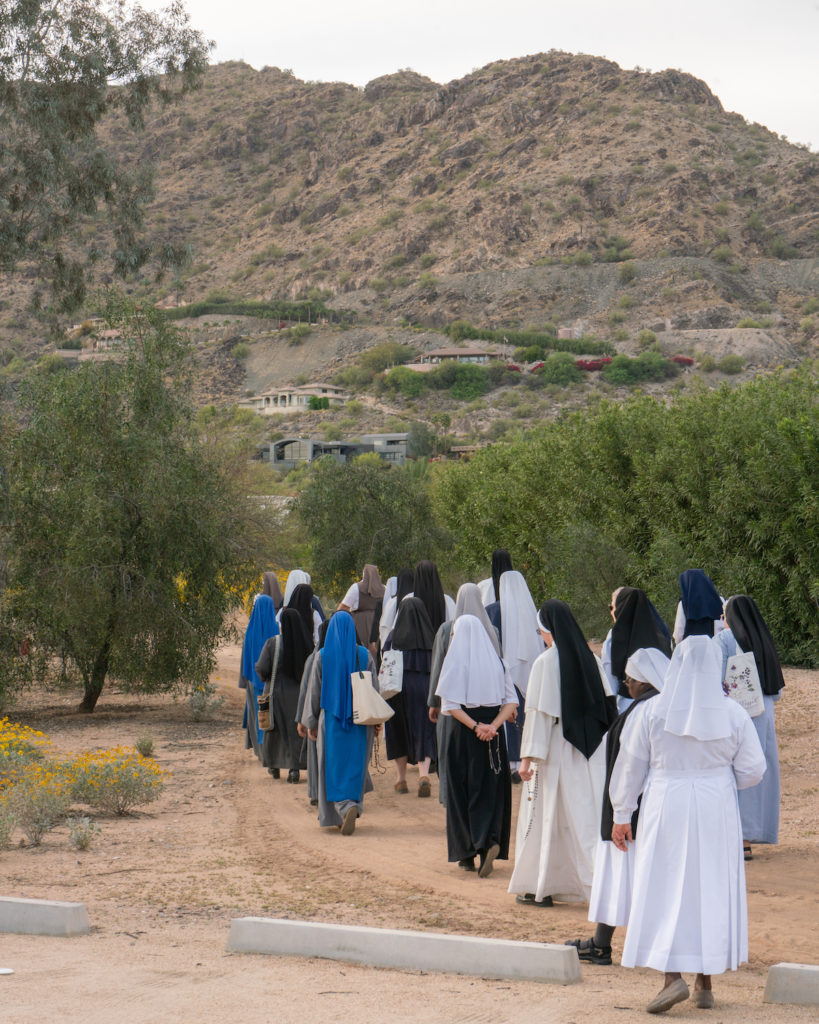
It was her friend’s openness to the Lord that allowed Sr. Anthony Mary to be open, to discern that the Lord was calling her to something completely different than what she thought her life would look like. She’s been with the Religious Sisters of Mercy of Alma, Michigan, now for more than eleven years and has been serving in the Diocese of Phoenix for the last seven and a half.
Serving as the liaison between the consecrated religious brothers and sisters in the diocese and Bishop Olmsted, she has experienced the fruits that come from Bishop Olmsted welcoming new orders and individuals discerning new vocations to the diocese. He has welcomed a diocesan hermit, twelve new religious orders, the establishment of the Franciscan Friars of the Holy Spirit, two consecrated virgins, and many more.
Sr. Anthony Mary emphasized the way that Bishop Olmsted promotes vocations in the diocese.
“Bishop Olmsted is very much a man who inspires the formation of the human person to be integral and holy. He inspires everyone to live for God, to know that he or she is a beloved son or daughter, and that he or she is meant to glorify God, whether it be as a priest, religious, married person with a family, or someone who’s serving the best that they know how in a single state.”
Sr. Anthony Mary remembered when a priest in the diocese approached Bishop Olmsted after feeling called to become a hermit. The priest discerning this new vocation wasn’t the only one who was undergoing discernment with his vocation. Bishop Olmsted discerned with him.
“Not every bishop has the courage to try it out. It’s unusual that a priest wants to be a hermit, and it’s a very intense, thorough discernment process. Not every bishop will have the courage to try something that different, but he’s so open to the Holy Spirit guiding and leading and going in directions he never imagined.”
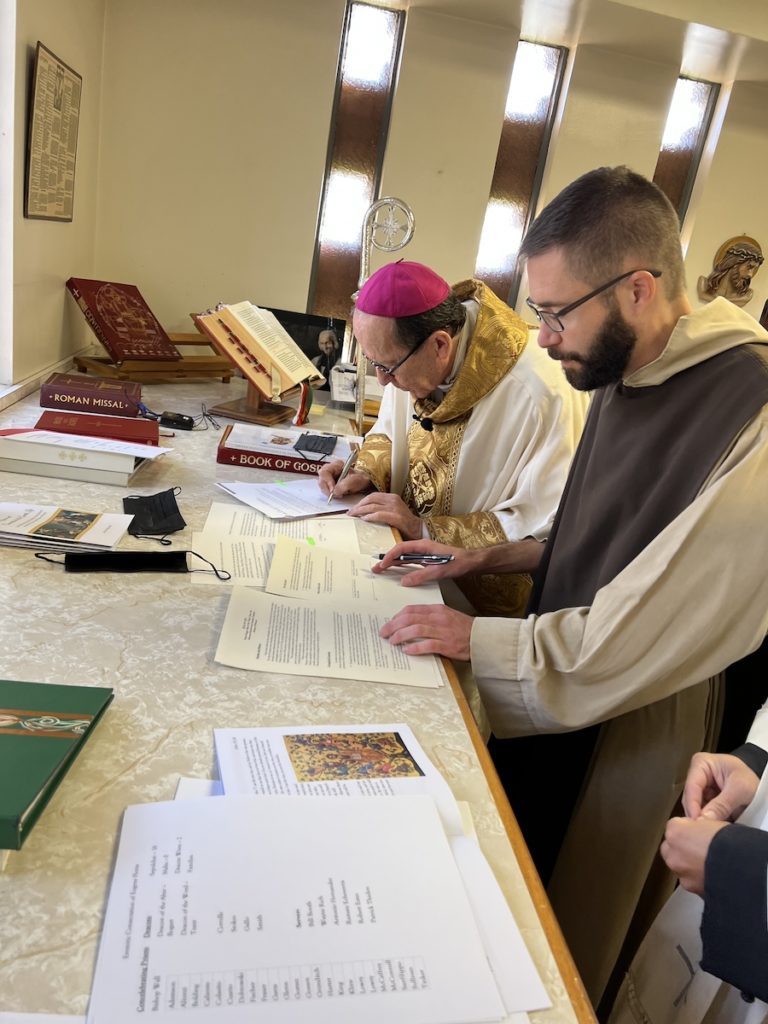
Working with Bishop Olmsted and seeing how he draws out the vocations of others became all the more real when Sr. Anthony Mary’s roommate from college came to visit before she was elected superior general of her order. Being the apostolic administrator of the Byzantine Eparchy of Phoenix, which encompasses thirteen western states, Bishop Olmsted is very knowledgeable about the church in Russia and the difficulties that come with evangelizing there, as Sr. Anthony Mary’s friend experienced.
Sr. Anthony Mary emotionally recalled the moment her college roommate, the same roommate who inspired Sr. Anthony Mary’s religious vocation, met Bishop Olmsted. Sr. Anthony Mary emphasized that the bishop’s gift to affirm those in their vocations is a universal feeling among those he encounters. She has felt the effects of his affirmation.
“He is an incredible spiritual father. When they met, he was completely aware of all the challenges that she faces in Russia, and he had a complete appreciation for her vocation so much so that it gave her an incredible affirmation of her vocation and courage to face more challenges that she has within her community.”
Sr. Anthony Mary’s friend was elected mother general two weeks after speaking with Bishop Olmsted. Sr. Anthony Mary believing that talking with Bishop Olmsted gave her the courage she needed to face challenges God had in store.
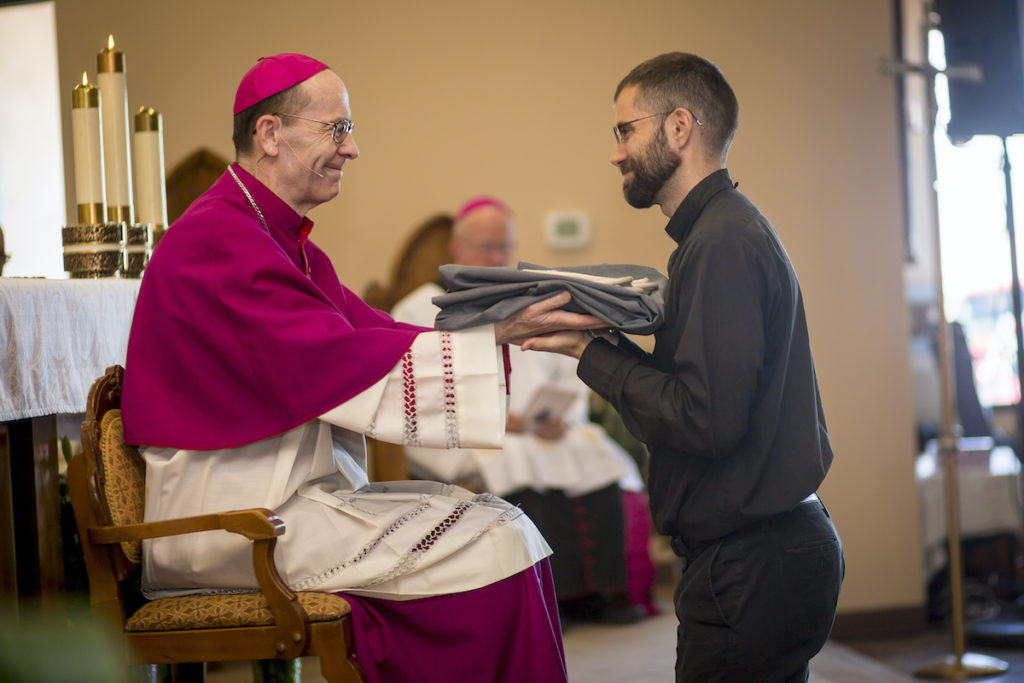
Fr. Paul Sullivan, Director of Vocations for the Diocese of Phoenix, has also had a first-hand experience in seeing how Bishop Olmsted affirms vocations. Fr. Sullivan currently serves as parochial administrator at St. Gregory parish and the rector of Nazareth House of formation for seminarians in the diocese.
Fr. Sullivan explained the origins of Nazareth House, saying how blessed the diocese is. “It came as a result of [Bishop Olmsted’s] prayers. He believes that we have a very important responsibility to form men as best as we can to be as united to Jesus Christ as they can be, and that happens most especially at the beginning of formation. Bishop decided it would be good for us to have our own seminary.”
“It’s great to see vocations working in young people and guys honestly saying ‘Alright Lord, what do you want me to do with my life?’”
Bishop Olmsted takes his role very seriously being in charge of the discernment and formation of seminarians. When a young man is accepted into Nazareth House, Bishop Olmsted is very attentive to that and is very close to that process. He gets to know the young man, and, while he is in seminary, Bishop pays attention to the seminarian’s readiness and his current level in formation. He personally gets to know every one of the seminarians: he reads all the files, meets with them, and spends time with them, even going on annual hikes to places like the Mogollon Rim and Mt. Lemon.
Aside from hands-on formation with the seminarians, Bishop Olmsted has aided in their formation through the various documents he’s written. Not just inspiring seminarians at Nazareth House, Bishop Olmsted has inspired people of all vocations with his many writings like Veneremur Cernui: Down in Adoration Falling, an Exhortation on the Eucharist; Into the Breach, an Exhortation to Men, and Complete My Joy, to the Mothers and Fathers, Husbands and Wives of the Diocese of Phoenix.
Fr. Sullivan explained that many of the seminarians have read and find inspiration from Into the Breach, written to inspire for men in their personal relationships with Jesus. “There’s a desire for holiness, a desire for closeness to the Lord and I’ve seen a great increase in joy, an increase of zeal among young men as a result of that document.”
“Bishop Olmsted is grounded in the Lord, Jesus Christ, so His leadership is discernment, seeking the Lord’s will, making preemptive decisions. His leadership style follows his style of prayer: faithfulness.”
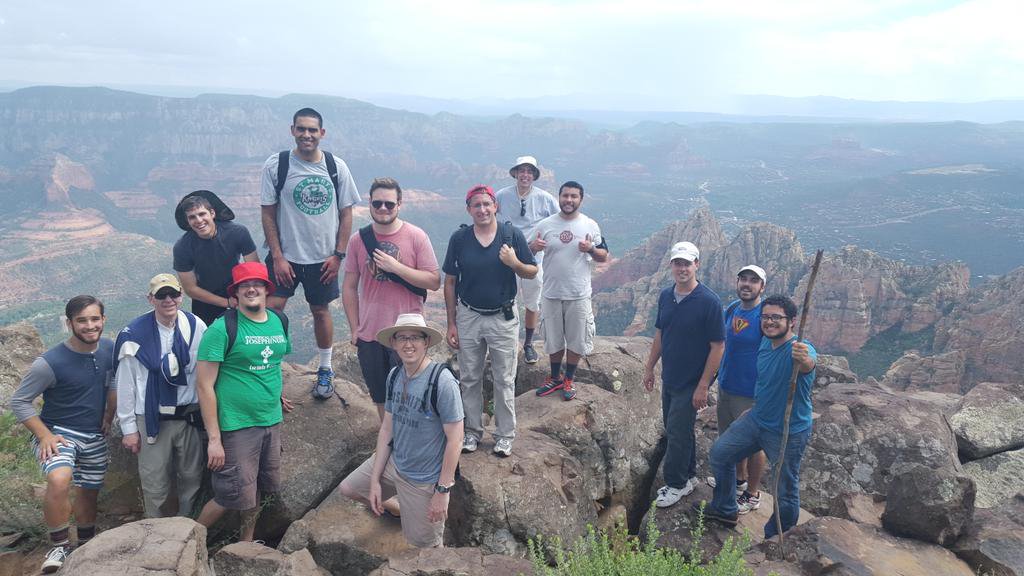
Cathy Carlson, director of Religious Education at San Francisco de Asis Parish in Flagstaff, Ariz., has also been a witness to the bishop’s leadership style rooted in faithfulness to the Lord. She was a volunteer with religious education at SFdA school when the bishop’s letter, Gift from on High, was released in May of 2005, where Bishop Olmsted officially announced that the age for confirmation was being changed from high school to third grade.
Carlson had been volunteering ever since her oldest child had been going through religious education, aiding the director at the time. When that DRE left, Carlson was asked to come on full-time, in the midst of the transition for confirmation.
Although Carlson said that the transition wasn’t easy, she trusted in Bishop Olmsted’s discernment. She explained that a lot of families were confused, thinking how could 3rd graders be educated on the Holy Spirit?
It was at a huge Pentecost Mass in Flagstaff that was held at the NAU dome, the same year the change was made, that Carlson heard Bishop Olmsted speak on the Holy Spirit, and it all became clear to her.
“He said ‘I want to tell you as your bishop, I don’t even understand the Holy Spirit.’”
It was Bishop Olmsted’s humility that helped her to realize that it’s not about understanding the Holy Spirit fully, it’s about receiving the graces that come from accepting the Holy Spirit into your heart — something that kids do even better than adults, she argues.
“With kids, when you say, ‘The Holy Spirit will be with you, and the Holy Spirit will help you’ they know that’s true; they believe that because their hearts are just so open.”
Being a parent herself, her two children now grown, Carlson is thankful that her children received the sacrament of confirmation in third grade. She thought back to when she received the sacrament as a high schooler and compares it to the 3rd graders she witnesses receive the sacrament. As a parent, she felt a sigh of relief, knowing that her children received sacramental graces so much earlier. She also felt it was a gift to her and her husband — a help to them as parents.
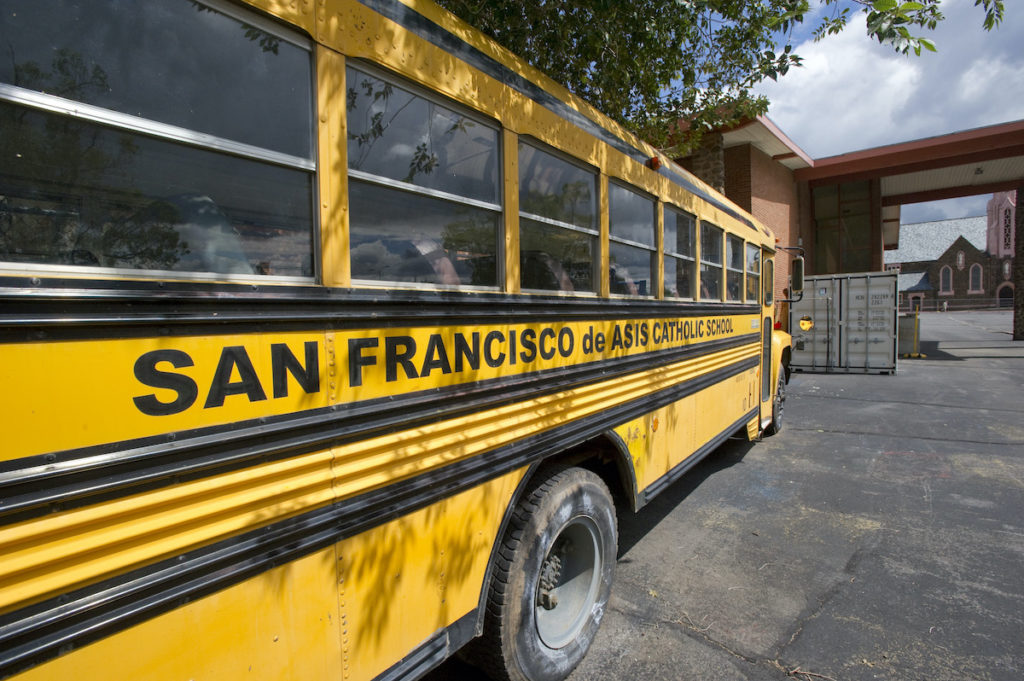
“Kids are faced with lots of hard things. Kids as young as second graders have to defend their faith on the playground at school. The world is really hard right now. [But] I know the Holy Spirit is journeying with them, and it makes me feel like they’ve got a team. They’ve got an earthly team [and] a heavenly team that are all working for their greater good, and all for the glory of God.”
Just as Sr. Anthony’s friend in Russia and the seminarians have felt affirmed in their vocations, Carlson has felt the same from Bishop Olmsted. Tears sprang to Carlson’s eyes as she recalled the moment. It was after the blessing of SFdA, the first Mass in the church when Bishop Olmsted walked around the adjacent school, blessing the offices and classrooms.
Carlson waited outside her classroom, eager to welcome the bishop. She remembered thinking of years of work in the church leading up to this moment — working in the trenches, embracing the difficult tasks that come with working for the church, feeling overwhelmed.
“He looked around and he was like, ‘So this is where all the magic happens.’ And he looked at me and he said ‘God bless you in all your good works.’ I get emotional because it wasn’t him saying it, it was the Lord saying it. I feel so strongly his connection to the Lord, and I’m so grateful for the way he’s led us all these years. I trust in him even when he makes hard decisions, like bring[ing] confirmation to 3rd grade, it was hard but I know it was the right thing and I see the fruits of that.”







